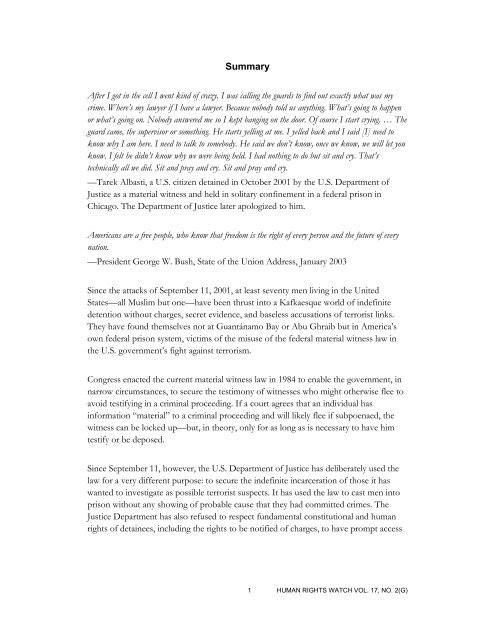Witness to Abuse - Human Rights Watch
Witness to Abuse - Human Rights Watch
Witness to Abuse - Human Rights Watch
You also want an ePaper? Increase the reach of your titles
YUMPU automatically turns print PDFs into web optimized ePapers that Google loves.
Summary<br />
After I got in the cell I went kind of crazy. I was calling the guards <strong>to</strong> find out exactly what was my<br />
crime. Where’s my lawyer if I have a lawyer. Because nobody <strong>to</strong>ld us anything. What’s going <strong>to</strong> happen<br />
or what’s going on. Nobody answered me so I kept banging on the door. Of course I start crying. … The<br />
guard came, the supervisor or something. He starts yelling at me. I yelled back and I said [I] need <strong>to</strong><br />
know why I am here. I need <strong>to</strong> talk <strong>to</strong> somebody. He said we don’t know, once we know, we will let you<br />
know. I felt he didn’t know why we were being held. I had nothing <strong>to</strong> do but sit and cry. That’s<br />
technically all we did. Sit and pray and cry. Sit and pray and cry.<br />
—Tarek Albasti, a U.S. citizen detained in Oc<strong>to</strong>ber 2001 by the U.S. Department of<br />
Justice as a material witness and held in solitary confinement in a federal prison in<br />
Chicago. The Department of Justice later apologized <strong>to</strong> him.<br />
Americans are a free people, who know that freedom is the right of every person and the future of every<br />
nation.<br />
—President George W. Bush, State of the Union Address, January 2003<br />
Since the attacks of September 11, 2001, at least seventy men living in the United<br />
States—all Muslim but one—have been thrust in<strong>to</strong> a Kafkaesque world of indefinite<br />
detention without charges, secret evidence, and baseless accusations of terrorist links.<br />
They have found themselves not at Guantánamo Bay or Abu Ghraib but in America’s<br />
own federal prison system, victims of the misuse of the federal material witness law in<br />
the U.S. government’s fight against terrorism.<br />
Congress enacted the current material witness law in 1984 <strong>to</strong> enable the government, in<br />
narrow circumstances, <strong>to</strong> secure the testimony of witnesses who might otherwise flee <strong>to</strong><br />
avoid testifying in a criminal proceeding. If a court agrees that an individual has<br />
information “material” <strong>to</strong> a criminal proceeding and will likely flee if subpoenaed, the<br />
witness can be locked up—but, in theory, only for as long as is necessary <strong>to</strong> have him<br />
testify or be deposed.<br />
Since September 11, however, the U.S. Department of Justice has deliberately used the<br />
law for a very different purpose: <strong>to</strong> secure the indefinite incarceration of those it has<br />
wanted <strong>to</strong> investigate as possible terrorist suspects. It has used the law <strong>to</strong> cast men in<strong>to</strong><br />
prison without any showing of probable cause that they had committed crimes. The<br />
Justice Department has also refused <strong>to</strong> respect fundamental constitutional and human<br />
rights of detainees, including the rights <strong>to</strong> be notified of charges, <strong>to</strong> have prompt access<br />
1 HUMAN RIGHTS WATCH VOL. 17, NO. 2(G)
















